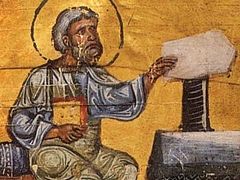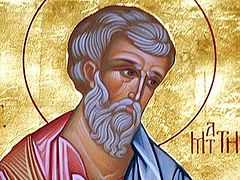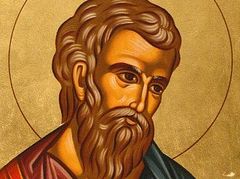In the name of the Father, the Son, and the Holy Spirit.
I greet you all, brothers and sisters, with the commemoration day of Apostle and Evangelist Matthew. A remarkable destiny! Just imagine that some roving teacher, a homeless wanderer, walks up to Apostle Matthew’s colleague, our contemporary (a supervisor in the Internal Revenue Service or the local police, for example) and says, “Follow after me.” And that person drops everything and goes. This is what happened with that great apostle, who not only showed us his amazing faith in Christ and extraordinary perspicacity, but also his understanding that no earthly blessings even come close to that great spiritual blessing of eternity, which only God can reveal. He leaves everything and goes, for the sake of that greatest blessing—love of God; for the sake of that truth, which Apostle Matthew saw in the wandering pauper, the persecuted Teacher Whom many held in contempt.
One of these apostles (there were only twelve of them) wrote the great Gospel according to St. Matthew, which is what we read first in the New Testament. There is no other story about the life of the Savior written like St. Matthew’s. All the Gospels are particular and beautiful. Each emphasizes something special of its own. But all together—the story of the Spirit, of the Coming of the Messiah to the world, Christ’s teaching, His divinity, His parables—are collected in a special way in the Gospel of Matthew.
Where did he get such power that two thousand years on, his story should so enliven our hearts? A man who was not a writer, who two thousand years ago wrote only one book, did what all the professional authors in the world could not do. He created a book that countless multitudes of people read, a book that brings its readers not just to knowledge, to the discovery of something new, but to eternal life. Apostle Matthew’s power was in God, and that power was manifested in the Church.
The apostles, like all Orthodox Christians, are powerful not in and of themselves, but only because they abide in the Church. An army is not strong in only one soldier, officer, general, or marshal, but in their being all together the whole army. For us it is especially important that the power of the Christian—his spiritual enlightenment, knowledge, and salvation—is all possible only in the Church. The apostle Paul writes about this to his disciples in his Epistle to the Ephesians, convincing them of fundamentals of life in the Church, without which they will fall away from the Church if they do not fulfill God’s Commandments. How tedious it is for us to endlessly hear about how good we’re supposed to be. We are persuaded of this from kindergarten age. But there is a great truth in this! By living properly, virtuously, according to the laws of goodness in the world, we become a part of that good society that our parents would like to see us in.
Stating the Christian’s great calling and the supernatural tasks set before us of perfecting our souls, the apostle tells us about how we will abide in the Church. This will give us strength! And if we fulfill these Commandment of Christ, we will fulfill our duty to the Church. How terrible it is not to fulfill our duty! How terrible it is to betray everyone, to fall away from the community to which you have given a vow! In this case we are talking about a Christian community, about the Church. But let’s also look at other communities. Doctors are told for seven or more years what a doctor should be, what kind of professionalism he should have, what habits, and how caring he should be. But what if a doctor ceases to fulfill all the commandments and laws of medical practice? He’ll become a murderer, a monster. In the army, all the constant talk about the same thing—oaths and rules—sometimes seems excessive to young soldiers and officers. They talk about those things so that military men would not fall in to the serious sin of departing from the rules. Apostle Paul says to Christians, I … beseech you that ye walk worthy of the vocation wherewith ye are called (Eph. 4:1). Imagine if in the army, soldiers and so forth were to stop fulfilling their duties, as sometimes happens with us Christians. In the military, those who stop fulfilling their duties are deserters, cowards, and traitors.
 Metropolitan Tikhon (Shevkunov) of Pskov and Porkhov
Metropolitan Tikhon (Shevkunov) of Pskov and Porkhov
The same thing happens in the Church of Christ if we do not act “worthy of the vocation wherewith we are called.” We not only place ourselves in terrible danger and destroy our souls, but also enfeeble the Church and become traitors not only of our own salvation, but of the work of God, into which we joined by our faith, our Baptism, and our Communion of the Holy Mysteries of Christ. The Apostle is talking about God’s Commandments. How do we fulfill them? With what spirit do we need to be filled in order to fulfill these commandments, so that the yoke of Christ would be easy for us to bear? The Apostle gives us a hint: With all lowliness and meekness, with longsuffering, forbearing one another in love (Eph. 4:2). With all lowliness (humility). That is, without placing ourselves higher than others, not even a person we don’t like, or a person who has done us much wrong. We are aware of this, we oppose evil, but we don’t exalt ourselves over that person. We can be very tough against evil, and we must stop evil. But we should not exalt ourselves over that wretched person who is the bearer and doer of that evil. This is what we are shown by the experience of the Spirit that the apostle Paul acquired with meekness and longsuffering. In ancient times, longsuffering was the main virtue of a warrior. Nowadays patience is unfortunately perceived as weakness, as if someone has backed himself into a corner and just endures. The longsuffering warrior did not run from the field of battle. He fought to the end, was faithful to his calling to the end. Sometimes he would even die, but he endured all the difficulties of battle, all the outrageous sufferings of war to the very end.
With all lowliness and meekness, with longsuffering, forbearing one another in love. In antiquity, love was not defined by one word. In the ancient Greek language, they even had four words for it. One of them meant a sincere, kind disposition toward another person. I mean the relationship not of a husband and wife, but between people. Sometimes that kind disposition is missing. It sometimes happens that it’s hard for us to give our heart to another person. But there is yet another understanding of love—supreme love in God, as to our own brother—even though he might be a wretch who has done much evil. But we don’t reject him completely. We nevertheless love him as God’s creation. This is the commandment of people who are part of Christ’s Church. If you are a Christian, you should find such love even for your foes and enemies. Perhaps you can’t have that same love in your heart that you have for your close friend or your brother, because that person has done everything to make it impossible. But you should seek this supreme love in God as for the creation, as for a child of God, as for a being who can also repent, a being who, just like you, is filled with sins and weaknesses. We should find that particular love for any person. And then we will build up God’s Church—not the righteousness of this world, but the righteousness of the Kingdom of Heaven.
“I beseech you that ye walk worthy of the vocation wherewith ye are called, endeavouring to keep the unity of the Spirit in the bond of peace.” This is also very important. Spiritual unity is first of all in our faith, and then in those beautiful ideals that we were taught to love by our parents, our nation, and our earthly communities.
The unity of the Spirit in the bond of peace. There can be debates, arguments, or discussions. But it is much more precious to preserve the bond of peace between people than to win any argument. The apostle also talks about this. Peace between people cannot be at the expense of lies and sin, nor because we demand complete agreement in things that are insignificant or of secondary importance. We humble ourselves! St. Vincent of Lerins said, “In the main thing—unity; in the secondary—freedom; and in all things—love.” Let us give our brothers and sisters freedom in what is of secondary importance. Let’s not be fanatics over details. Let’s not be so proud as to demand that they agree with us in everything. Peace is infinitely more important!
The Apostle says, Here is one body, and one Spirit, even as ye are called in one hope of your calling; one Lord, one faith, one baptism, one God and Father of all, who is above all, and through all, and in you all (Eph. 4:4–6). This is understandable: The Lord is Sovereign over all of us and acts through all. That is how He deigns it to be in this world—to work also through people. He works on you through me, and through you on me—through your prayers, your deeds, your care, your fulfillment of God’s Commandments, and through your presence in the Church. One Lord, one faith, one baptism, one God and Father of all, who is above all, and through all, and in you all. God is in each one of us. The Church of the Holy Trinity—of the Father, the Son, and the Holy Spirit—is founded by God Himself in each one of us.
We come to know this with our whole lives. We will pray to God for this main thing—that you would always abide in the Church and not harm it in any way; that we who have made our vows to the Lord Jesus Christ Himself and His Church would be Christians, that we would keep the commandments and rules that the Almighty and Immortal God established for the Church, so that He would bring His people to Himself precisely in the Church, and that the Church would be His visible Body here on earth. Let none of us become traitors to this great work!
I congratulate you all with the feast of your heavenly patron, the Apostle and Evangelist Matthew.




